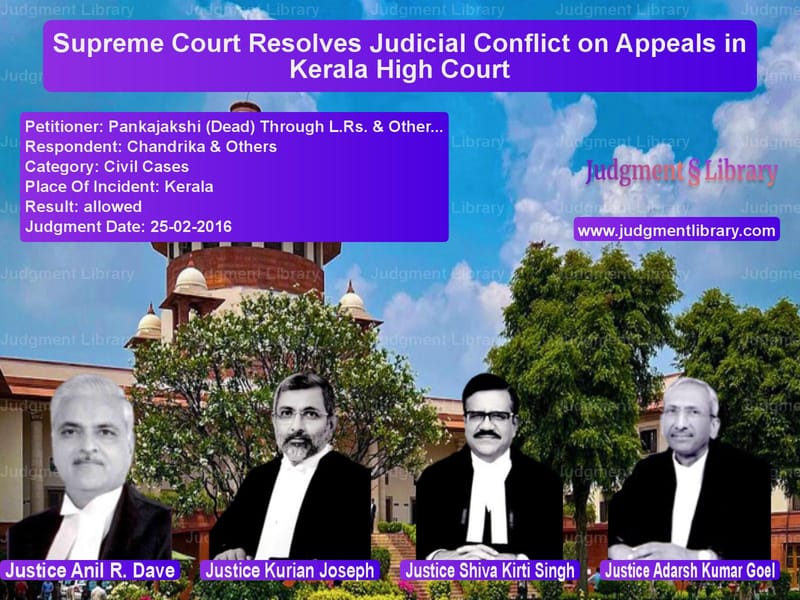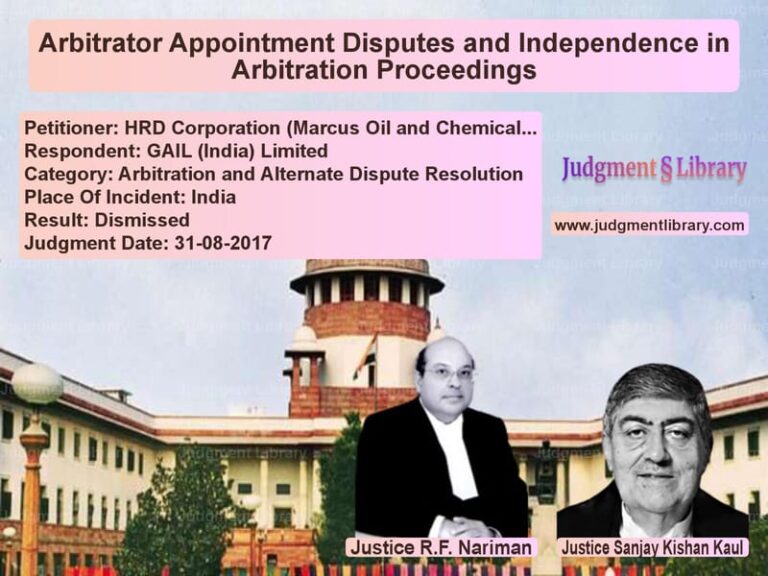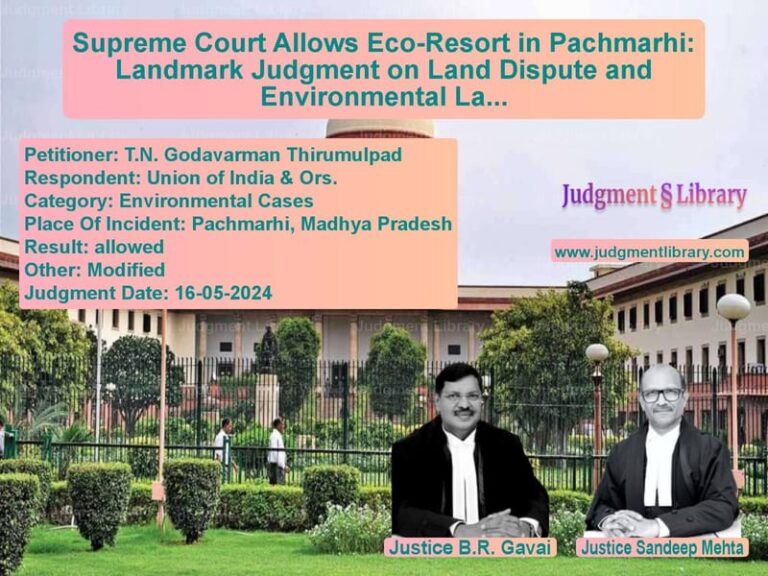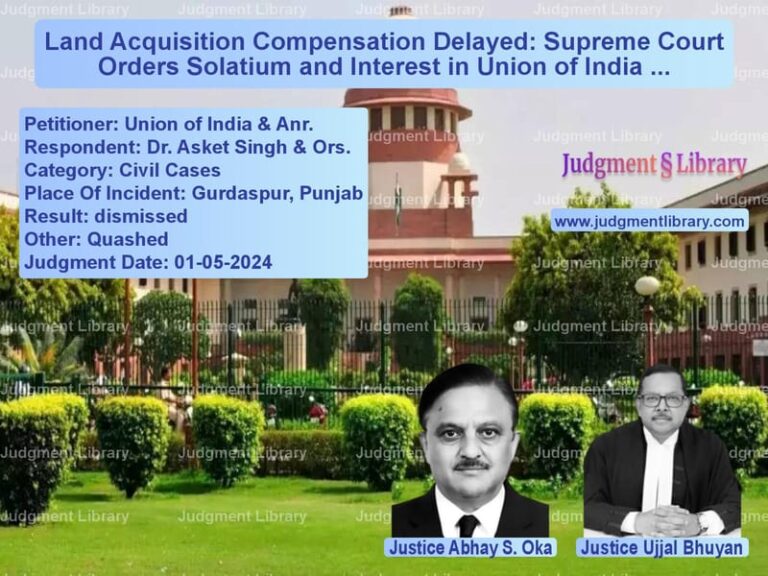Supreme Court Resolves Judicial Conflict on Appeals in Kerala High Court
The Supreme Court of India, in a landmark judgment, resolved a long-standing judicial conflict regarding the interpretation of Section 98 of the Code of Civil Procedure (CPC) vis-à-vis the provisions of the Travancore-Cochin High Court Act and the Kerala High Court Act. The case involved two appeals: Pankajakshi (Dead) Through L.Rs. & Others vs. Chandrika & Others and Pulparambil Vasudevan vs. Nanganadath Pulparambil Devadasan & Others. The Court’s ruling clarified the procedure to be followed when a Division Bench of the Kerala High Court is divided on an issue.
Background of the Case
The matter revolved around a judicial discrepancy between the Kerala High Court Act, 1958, and the older Travancore-Cochin High Court Act, 1125. The core issue was whether Section 23 of the Travancore-Cochin Act, which allowed reference to a third judge in case of a disagreement between two judges of a Division Bench, remained valid after the enactment of the Kerala High Court Act and whether Section 98(2) of the CPC, which only allows reference in case of a legal disagreement, superseded it.
Petitioner’s (Pankajakshi & Others) Arguments
- The petitioners argued that Section 23 of the Travancore-Cochin Act was a special law that governed Kerala High Court procedures and was not repealed by the Kerala High Court Act.
- They contended that the existing legal framework allowed for all disagreements, factual or legal, to be referred to a third judge, which should continue as the established practice.
- They cited precedent from judgments that recognized High Court Charters and special legislations prevailing over general laws like the CPC.
Respondent’s (Chandrika & Others) Arguments
- The respondents asserted that Section 98(2) of the CPC, which limits reference to a third judge to cases involving a point of law, should prevail over the older Travancore-Cochin High Court Act.
- They argued that the Kerala High Court Act of 1958 effectively repealed the provisions of the Travancore-Cochin Act wherever they were in conflict.
- They contended that uniformity in legal procedures across High Courts was necessary, and thus, the general law (CPC) should apply.
Supreme Court’s Observations and Ruling
The Supreme Court, in a five-judge bench decision led by Justice R.F. Nariman, provided a detailed analysis of the legal provisions.
1. Special Law Prevails Over General Law
The Court held that Section 23 of the Travancore-Cochin Act was a special provision applicable to the Kerala High Court. It was not repealed by the Kerala High Court Act and, therefore, continued to govern the procedure in case of differences in judicial opinions.
“Section 23 of the Travancore-Cochin Act remains unaffected by the repealing provision of Section 9 of the Kerala High Court Act and would apply in preference to Section 98(2) of the CPC.”
2. Reference to a Third Judge Allowed for Both Facts and Law
The Court distinguished between the CPC’s approach, which allows referral to a third judge only for legal disagreements, and the Travancore-Cochin Act, which allowed referral for both legal and factual disagreements. It ruled that the latter provision applied to the Kerala High Court.
“In case of a disagreement in an appeal heard by a Division Bench of the Kerala High Court, the matter should be referred to a third judge, irrespective of whether the disagreement is on law or fact.”
3. Consistency Across Kerala’s Legal Jurisdiction
The Court emphasized that applying different rules to different High Court regions would create inconsistencies. Since the Travancore-Cochin Act was historically part of Kerala’s judicial framework, its procedures should remain applicable.
4. Overruling of P.V. Hemalatha Judgment
The Court overruled the earlier decision in P.V. Hemalatha vs. Kattamkandi Puthiya Maliackal Saheeda, which had held that Section 98(2) of the CPC prevailed over the Travancore-Cochin High Court Act.
Final Verdict
The Supreme Court made the following directions:
- The appeal was allowed, and the previous conflicting rulings were set aside.
- Section 23 of the Travancore-Cochin High Court Act shall govern the Kerala High Court in case of judicial differences.
- The matter shall be decided according to the opinion of the majority of the judges, including the third judge.
- No costs were imposed on either party.
Implications of the Judgment
This judgment clarifies the legal position regarding procedural conflicts between special High Court Acts and the CPC. It reinforces the principle that special laws governing High Courts take precedence over general procedural codes.
Key Takeaways:
- Special provisions in High Court Charters or Acts continue to hold authority over general laws like the CPC.
- The Kerala High Court must follow Section 23 of the Travancore-Cochin Act for resolving judicial differences.
- The ruling ensures consistency in Kerala’s legal proceedings and prevents arbitrary application of procedural laws.
- Overrules previous judgments that misapplied the CPC over special High Court provisions.
This decision sets a strong precedent for interpreting conflicts between special state-specific legal provisions and general laws applicable across India.
Don’t miss out on the full details! Download the complete judgment in PDF format below and gain valuable insights instantly!
Download Judgment: Pankajakshi (Dead) T vs Chandrika & Others Supreme Court of India Judgment Dated 25-02-2016-1741852805158.pdf
Direct Downlaod Judgment: Direct downlaod this Judgment
See all petitions in Property Disputes
See all petitions in Specific Performance
See all petitions in Damages and Compensation
See all petitions in Judgment by Rohinton Fali Nariman
See all petitions in Judgment by Anil R. Dave
See all petitions in Judgment by Kurian Joseph
See all petitions in Judgment by Shiva Kirti Singh
See all petitions in Judgment by Adarsh Kumar Goel
See all petitions in allowed
See all petitions in supreme court of India judgments February 2016
See all petitions in 2016 judgments
See all posts in Civil Cases Category
See all allowed petitions in Civil Cases Category
See all Dismissed petitions in Civil Cases Category
See all partially allowed petitions in Civil Cases Category







